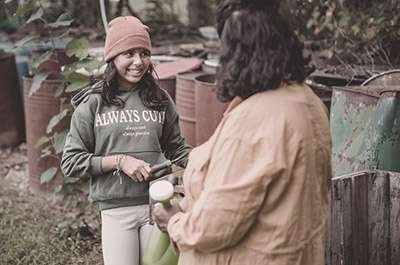Join me on a delightful journey where I share my approach to imparting valuable life lessons to my children and fostering a healthy relationship with resources and choices.
Talk to your kids about money.

This might seem obvious, but just bringing up money and teaching kids about it doesn’t happen by accident. The more you talk about money with your kids, the more they will internalize these messages and learn how to handle money in the future, so have these conversations with your kids as often as you can.
One of the most important things you can do is talk to your kids about money. This will help them understand what it’s all about and how they can use it in their daily lives. Talk to your kids about allowance, how much they need to save up for big items like toys, clothes, video games, and such, and how to treat it all responsibly.
Give them an allowance.
Allowance is a great way to help kids learn about money and responsibility. You can even tie it to chores so they understand that, by helping out at home, they earn their keep and deserve some spending money as well.
Give your kids an allowance each week or month, depending on your family’s budget and savings goals. Make sure that the money you give them is what they need to buy the things that are important to them, like video games and toys.
This is a simple way to help your children learn about money because they will now receive payment for doing household chores, which will set the foundation for understanding what things cost in life and how much work it takes to earn those things. It also helps them learn about the concept of saving up their allowance and what to do if they have extra or want to spend it.
Teach them how to budget their allowance to save for bigger items like toys, clothes that they want, or entertainment like video games.
Be involved in what your kids are purchasing.
Don’t let your kids go off and make a purchase alone. Always ensure you know how much something costs, why they buy it, and whether or not it’s a good idea.
This one is important because it shows your children that you’re interested in the things they’re buying and helps them learn to make good financial decisions independently.
For example, if your kids get an allowance and buy video games with it, chat with them about the types of games they’re interested in and what platforms they play on. If you can help them understand that some consoles cost more money than others and how much longer the new game will take to save up for if it’s on the more expensive platform, it helps them decide what to buy.
It might seem tedious at first, but being involved in your kids’ purchases is one of the best things you can do for their money management skills because knowing exactly how much they have left to spend will help them prioritize their spending.
Offer your kids a safe place to save their money.

Kids need a safe place to store their money until they are old enough to use it themselves, whether that’s in a piggy bank or a savings account at the bank. You can offer to keep some of their allowances in a safe place, which teaches them the importance of saving money and helps build their savings account.
Start small with a piggy bank.
You can start your kids off with a simple piggy bank, where they can drop in every cent of their allowance (the money they get for their chores, too). Once it’s full, they can take it to the bank and open a savings account.
This is another good way to help your kids learn how much things cost, as well as what it’s like to save money. You can even open their account and show them how to transfer their allowance into it each week or month. If they’re older, you could give them a debit card that they can use at the bank machine, which means they have to learn even more about how money works.
Explain the difference between needs and wants.
Another great way to help your children learn about money is to explain the difference between a need and a want.
A need is something important, like a roof over your head or a car for transportation. A want is something that’s “nice” to have but isn’t necessary, like a video game or a pair of shoes.
Help your kids understand which items are needed and which ones are wanted by going over some examples with them. Explain how you need to pay for things like food and the roof over your head, but you might want a new jacket or a video game console.
Be a good example!
This is probably the most important thing you can teach your kids about money because, as they say, “do as I say and not as I do”.
Even if you’re struggling financially sometimes and don’t have a lot of money to spend on your kids or other family members, don’t expect them to be responsible with their allowances and budgets if you’re not doing the same.
If you want them to save mhttps://10bestforwomen.com/save-money/oney, make it clear that they don’t always have to buy new toys and clothes; sometimes, it’s okay if they spend their allowance on small items and save up for larger ones. If you want them to stay out of debt, explain what credit cards are and how using them responsibly (and paying them off) will help them in the long run.
Most kids are watching their parents more than they listen to what they say, so show your children how money should be used by using it wisely yourself!
Make it fun!

The best way to teach kids about money is to make it fun for them! Even if you don’t think they’ll catch on, there are lots of ways you can make learning about money fun.
Make a game out of it. You could pick random items when you’re at the grocery store with your kids and let them guess how much it costs. Or, have them put together a list of things the family needs for one week and compare it to a list of items you can afford by using only their allowance for the same amount of time.
How much would that cost? You could even take your kids out with you when you go shopping and quiz them on how much things cost as you’re browsing through the store. This can help to teach them about sales and different prices for similar items.
When it comes to teaching kids about money, putting in some effort on your part is worth it because kids who learn about finances early are more likely to be responsible with money when they are older.
If you’re helping your kids with their money management, make it fun by adding in some incentives. If they’ve been doing chores around the house for a while, offer to give them some of their allowances early as a reward for their hard work. Or, if they want something from the store but haven’t been saving up for it, give a portion of their allowance the next week as an incentive to save more.
Teaching money management skills when they’re young will help prepare your children for when they get older and leave home.
Help them set financial goals.
Another great way to help your kids learn about money is to help them set financial goals.
If you have a younger child who doesn’t have an allowance, have them pick out some toys or games they want and work together to create a budget for how much money they’ll need to reach their goal. If you have older kids with an allowance, suggest some ways they can budget and save up their money.
Teaching kids about goal setting and how to meet them is a great way to help prepare them for college and their future careers.
Don’t just tell them what not to do!

When you’re talking about the importance of saving money and avoiding debt, don’t just tell your children that they have to stay away from it.
Make sure you explain why these things are bad for them to understand more about money management and how their choices will play a role in the future.
If you don’t want them to get into debt, show them what it means by explaining credit cards and how spending more than you make is bad for your financial future.
If you want them to save, explain how it’s okay to buy some things new (shoes, clothes, etc.), but making large purchases like cars should only be done when they have the money saved up.
So instead of just telling your kids what not to do with their money, talk with them about the pros and cons of making these decisions. That way, they’ll be able to make more informed choices in the future.
Helping your children learn how to manage their money now will hopefully result in responsible young adults who can manage their finances when they move out on their own.
Encourage them to give back to their community.
If your children are enthusiastic about earning money, helping them find ways to give back is a great way to teach them how to manage money responsibly.
Volunteerism is not only good for your community, but it’s also beneficial for teaching kids about giving back and how rewarding it can be. Plus, many organizations offer incentives like college scholarships to students who participate in their volunteer programs.
If you want your children to give back, suggest ways to get involved in the community and start encouraging them to do so even if they don’t have an allowance.
Encourage your children to consider the environment before spending money.
Today’s world is all about convenience, speed, and ease; we want everything right now, and we don’t like to wait for it (hence the popularity of online shopping). We’re rushing around so much that it’s become normal to pay extra money to get things faster, whether it’s paying more for an expedited shipping method or buying something that was made faster and cheaper in a developing country.
This is why it’s so important for parents to teach their children about the environment and how buying new things all the time is not only bad for our planet but it’s also a waste of our hard-earned money.
Conclusion.
By teaching kids about money in a fun and engaging way, we can help them develop healthy financial habits that will last a lifetime. What are some of your favorite ways to teach kids about money? Let us know in the comments!

Meet Marcella Raskin: Founder, Editor-in-Chief, and a Maven in Human Potential
Dive into the rich tapestry of Marcella Raskin’s life and you’ll discover more than just an editor-in-chief. At the core, Marcella is a passionate writer, deeply committed to unlocking the boundless human potential. Armed with expertise in Cognitive Behavioral Therapy, Life Purpose Coaching, and Group Life Coaching, she’s carved a niche in helping both women and men unearth their true selves through the art of writing. Every article she pens is a gateway, inviting readers to shift mindsets and embrace transformation, even when change seems impossible.
Beyond her literary pursuits, Marcella is a fitness enthusiast, underpinned by her background in Exercise Physiology. And when she’s not empowering others or delving into the science of movement, she’s reveling in the joys of motherhood, raising two incredible girls, and sharing life’s moments with her beloved spouse.
Trust Marcella’s words; they’re backed by expertise, passion, and a journey full of learning and growth.
Reviewed By: Joanna Perez and Brenda Tillman
Edited By: Lenny Terra
Fact Checked By: Matthew Mansour
Photos Taken or Curated By: Matthew Mansour